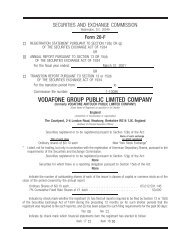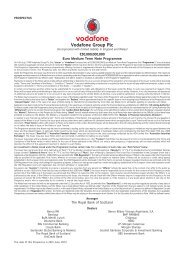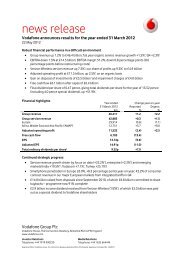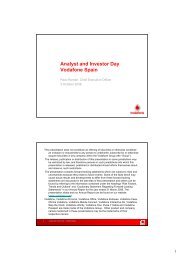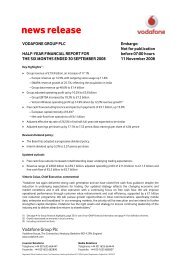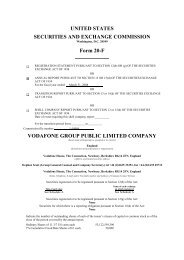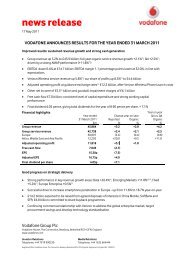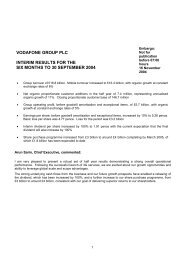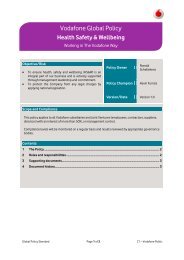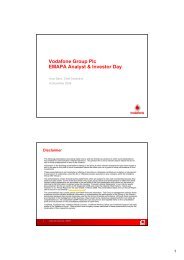You also want an ePaper? Increase the reach of your titles
YUMPU automatically turns print PDFs into web optimized ePapers that Google loves.
37. New accounting standards<br />
The Group has not adopted and does not intend to early adopt <strong>the</strong> following pronouncements, which have been issued by <strong>the</strong> IASB or <strong>the</strong> International Financial<br />
Reporting Interpretations Committee (“IFRIC”), but have not yet been endorsed for use in <strong>the</strong> EU.<br />
An amendment to IFRS 2 “Share-based Payment: Vesting Conditions and Cancellations” was issued in January 2008 and will be effective retrospectively for annual periods<br />
beginning on or after 1 January 2009. This amendment clarifies that vesting conditions are service conditions and performance conditions only, and as such, any o<strong>the</strong>r<br />
features of a share-based payment are not vesting conditions. It also specifies that all cancellations, whe<strong>the</strong>r by <strong>the</strong> entity or by o<strong>the</strong>r parties, should receive <strong>the</strong> same<br />
accounting treatment. The Group is currently assessing <strong>the</strong> impact and expected timing of adoption of this amendment on <strong>the</strong> Group’s results and financial position.<br />
IFRS 3 (Revised) “Business Combinations” was issued in January 2008 and will apply to business combinations occurring on or after 1 April 2010. The revised standard<br />
introduces a number of changes in <strong>the</strong> accounting for business combinations that will impact <strong>the</strong> amount of goodwill recognised, <strong>the</strong> <strong>report</strong>ed results in <strong>the</strong> period<br />
that a business acquisition occurs and future <strong>report</strong>ed results. Assets and liabilities arising from business combinations before 1 April 2010 will not be restated and thus<br />
<strong>the</strong>re will be no effect on <strong>the</strong> Group’s results or financial position on adoption. However, this standard is likely to have a significant impact on <strong>the</strong> accounting for<br />
business acquisitions post adoption.<br />
IAS 1 (Revised) “Presentation of Financial Statements” was issued in September 2007 and will be effective for annual periods beginning on or after 1 January 2009.<br />
The revised standard introduces <strong>the</strong> concept of a statement of comprehensive income, which enables users of <strong>the</strong> financial statements to analyse changes in a<br />
company’s equity resulting from transactions with owners separately from non-owner changes. The revised standard provides <strong>the</strong> option of presenting items of<br />
income and expense and components of o<strong>the</strong>r comprehensive income ei<strong>the</strong>r as a single statement of comprehensive income or in two separate statements.<br />
The Group does not currently believe <strong>the</strong> adoption of this revised standard will have a material impact on <strong>the</strong> consolidated results or financial position of <strong>the</strong> Group.<br />
IAS 23 (Revised) “Borrowing Costs” was issued in March 2007 and will be effective for annual periods beginning on or after 1 January 2009. It requires <strong>the</strong> capitalisation<br />
of borrowing costs, to <strong>the</strong> extent <strong>the</strong>y are directly attributable to <strong>the</strong> acquisition, production or construction of a qualifying asset. The existing option of immediate<br />
recognition of those borrowing costs as an expense has been removed. The Group is currently assessing <strong>the</strong> impact and expected timing of adoption of this standard<br />
on <strong>the</strong> Group’s results and financial position.<br />
An amendment to IAS 27 “Consolidated and Separate Financial Statements” was issued in January 2008 and is effective for annual periods beginning on or after<br />
1 July 2009. The amendment requires that when a transaction occurs with non-controlling interests in Group entities that do not result in a change in control, <strong>the</strong><br />
difference between <strong>the</strong> consideration paid or received and <strong>the</strong> recorded non-controlling interest should be recognised in equity. In cases where control is lost, any<br />
retained interest should be remeasured to fair value with <strong>the</strong> difference between fair value and <strong>the</strong> previous carrying value being recognised immediately in <strong>the</strong><br />
income statement. Transactions occurring before 1 April 2010 will not be restated and thus <strong>the</strong>re will be no effect on <strong>the</strong> Group’s results or financial position on<br />
adoption. However, <strong>the</strong> Group has historically entered into transactions that are within <strong>the</strong> scope of this standard and may do so in <strong>the</strong> future.<br />
“Amendments to IAS 32 Financial Instruments: Presentation and IAS 1 Presentation of Financial Statements – Puttable Financial Instruments and Obligations Arising<br />
on Liquidation” was issued in February 2008 and is effective for annual periods beginning on or after 1 January 2009. The amendments require entities to classify<br />
certain financial instruments as equity if certain specific criteria are met. The Group is currently assessing <strong>the</strong> impact and expected timing of adoption of this<br />
amendment on <strong>the</strong> Group’s results and financial position.<br />
IFRIC 12 “Service Concession Arrangements” was issued in November 2006 and is effective for annual periods beginning on or after 1 January 2008. The interpretation<br />
addresses how service concession operators should apply existing IFRSs to account for <strong>the</strong> obligations <strong>the</strong>y undertake and rights <strong>the</strong>y receive in service concession<br />
arrangements. The Group does not currently believe <strong>the</strong> adoption of <strong>the</strong>se pronouncements will have a material impact on <strong>the</strong> consolidated results or financial<br />
position of <strong>the</strong> Group.<br />
IFRIC 13 “Customer Loyalty Programmes” was issued in June 2007 and will be effective for annual periods beginning on or after 1 July 2008. The interpretation addresses<br />
how companies that grant <strong>the</strong>ir customers loyalty award credits when buying goods or services should account for <strong>the</strong>ir obligation to provide free or discounted goods<br />
and services if and when <strong>the</strong> customers redeem <strong>the</strong> credits. It requires that consideration received be allocated between <strong>the</strong> award credits and <strong>the</strong> o<strong>the</strong>r components<br />
of <strong>the</strong> sale. The Group is currently assessing <strong>the</strong> impact and expected timing of adoption of this standard on <strong>the</strong> Group’s results and financial position.<br />
IFRIC 14 “IAS 19 – The Limit on a Defined Benefit Asset, Minimum Funding Requirements and <strong>the</strong>ir Interaction” was issued in July 2007 and is effective for annual<br />
periods beginning on or after 1 January 2008. The interpretation provides guidance on determining <strong>the</strong> amount of any post employment benefit surplus that could be<br />
recognised as an asset on <strong>the</strong> balance sheet, how a minimum funding requirement affects that measurement, and when a minimum funding requirement can create<br />
an onerous obligation that should be recognised as a liability in addition to that o<strong>the</strong>rwise recognised under IAS 19. The Group will adopt this interpretation with effect<br />
from 1 April 2008 and is currently assessing <strong>the</strong> impact of adoption of this interpretation on <strong>the</strong> consolidated results and financial position of <strong>the</strong> Group.<br />
“Improvements to IFRSs” was issued in May 2008 and its requirements are effective over a range of dates, with <strong>the</strong> earliest effective date being for annual periods<br />
beginning on or after 1 January 2009. This comprises a number of amendments to IFRSs, which resulted from <strong>the</strong> IASB’s annual improvements project. The Group is<br />
currently assessing <strong>the</strong> impact and expected timing of adoption of <strong>the</strong>se amendments on <strong>the</strong> Group’s results and financial position.<br />
<strong>Vodafone</strong> Group Plc Annual Report 2008 131




